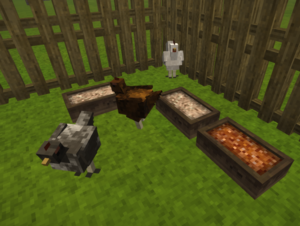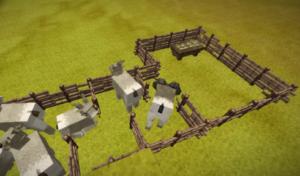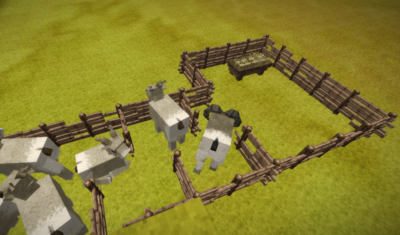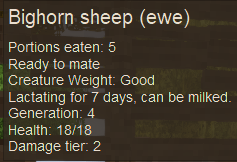Animal husbandry/ja: Difference between revisions
(Created page with "==収穫と解体==") |
(Updating to match new version of source page) |
||
| (40 intermediate revisions by 2 users not shown) | |||
| Line 1: | Line 1: | ||
<languages /> | <languages /> | ||
{{GameVersion|1.16}} | |||
<div class="mw-translate-fuzzy"> | |||
[[File:Chicken-with-trough.png|right|300px]] | |||
Vintage Storyには、ワールドを放浪する動物の一部を家畜化することができるゲームメカニズムがあります。動物を家畜化するにはオスとメスを最低でも1匹ずつ捕獲し、「監禁」した状態で子供を産ませる必要があります。世代を経ることで動物の行動は変化しますが、[[boar|イノシシ]]とオオツノ[[sheep|ヒツジ]]は家畜化しても攻撃されれば攻撃的になります。 | |||
</div> | |||
<div lang="en" dir="ltr" class="mw-content-ltr"> | |||
'''Domestication''' is the concept of animals losing fear of and aggressiveness towards players over generations. | |||
</div> | |||
<div lang="en" dir="ltr" class="mw-content-ltr"> | |||
Vintage Story includes a number of game mechanics that allow the domestication of some of the animals that roam the world. To domesticate animals, players must capture at least one male and one female so that offspring can be bred to become more and more accustomed to the player. The animals' behavior changes after multiple generations - you can't change aggressiveness and fear of a specific animal; only their offspring will be less fearful and aggressive towards the player. Even after reaching high generations, {{ll|boar|boars}} and {{ll|bighorn sheep|bighorn sheep}} will still become aggressive when attacked. | |||
</div> | |||
__TOC__ | __TOC__ | ||
<div class="mw-translate-fuzzy"> | |||
==世代による変化== | ==世代による変化== | ||
産まれた子供の世代には母親の遺伝のみが影響し、父親は考慮されません。例えば3世代目のメスと4世代目のオスがいる場合、子供は常に母親の次の世代となり、4世代目になります。 | 産まれた子供の世代には母親の遺伝のみが影響し、父親は考慮されません。例えば3世代目のメスと4世代目のオスがいる場合、子供は常に母親の次の世代となり、4世代目になります。 | ||
</div> | |||
<div lang="en" dir="ltr" class="mw-content-ltr"> | |||
Only the mother's heritage matters; the father is not considered when checking for the offspring's generation. This means, if you have a female gen3 and a male gen4, the offspring will always be gen4, as the offspring will always be one generation higher than the mother. | |||
</div> | |||
<div class="mw-translate-fuzzy"> | |||
* 3世代後 | * 3世代後 | ||
** 動物は[[cleaver|肉切り包丁]]でほぼ即座に殺すことができるようになります。 | ** 動物は[[cleaver|肉切り包丁]]でほぼ即座に殺すことができるようになります。 | ||
| Line 17: | Line 33: | ||
** 攻撃的な動物は中立になり、刺激したときだけ攻撃してくるようになります。 | ** 攻撃的な動物は中立になり、刺激したときだけ攻撃してくるようになります。 | ||
** 動物はプレイヤーから逃げなくなります。 | ** 動物はプレイヤーから逃げなくなります。 | ||
</div> | |||
<div class="mw-translate-fuzzy"> | |||
バージョン1.14には、家畜の世代を変更するテスト用のコマンド<code>/debug setgen [number]</code>があります。設定したい世代を「number」で指定します。 | バージョン1.14には、家畜の世代を変更するテスト用のコマンド<code>/debug setgen [number]</code>があります。設定したい世代を「number」で指定します。 | ||
</div> | |||
==動物を動かす== | ==動物を動かす== | ||
| Line 24: | Line 43: | ||
バージョン1.4の時点では、野生の動物を捕まえたり、家畜化した動物を移動させたりするための、リードのような手段はありません。 | バージョン1.4の時点では、野生の動物を捕まえたり、家畜化した動物を移動させたりするための、リードのような手段はありません。 | ||
<div class="mw-translate-fuzzy"> | |||
===野生動物を捕まえる=== | ===野生動物を捕まえる=== | ||
野生の動物を捕まえるには、2つの方法があります。 | 野生の動物を捕まえるには、2つの方法があります。 | ||
</div> | |||
<div lang="en" dir="ltr" class="mw-content-ltr"> | |||
For capturing wild animals, three different methods can be employed: | |||
# '''Craft:''' Create a Reed Basket Trap and insert the appropriate food item as bait. Small creatures might enter the trap. The player then has 24 game-hours to transport the captured animal to an enclosure and release it before it dies inside the basket. Note that the player must have an empty backpack slot to pick up and transport these traps once an animal is inside. | |||
# '''Active:''' Provoke the animal with a weak attack. In return, it will try to attack the player. If the player then runs away, they will follow for a short distance. Alternatively, the animal may flee, in which case the player can chase them towards the desired location. This behavior can be used to guide them into previously prepared animal pens. If the player encounters a group of animals together, focus on the males, as females will follow their male counterpart. Wild hens will always try to flee from the player, while wild roosters will occasionally try to attack; again, use this to your advantage by leading them into a pen. | |||
# '''Passive:''' In an area nearby the desired animals, dig a pit at least 2 blocks deep and place a {{ll|Trough|trough}} with the appropriate food portions in it. Wait for the animals to fall into the pit trap, and convert the pit into the animal pen. Players may also dig a "moat" around the desired animal pen. As long as the desired food is placed correctly inside the pen, wild animals may be drawn to it and become trapped. | |||
</div> | |||
<div class="mw-translate-fuzzy"> | |||
===家畜化した動物を移動させる=== | ===家畜化した動物を移動させる=== | ||
[[File:Animal funelling.PNG|right|300px]] | [[File:Animal funelling.PNG|right|300px]] | ||
| Line 38: | Line 63: | ||
動物たちは元の囲いから餌入れに向かって歩き始めますが、動物同士を引き離すための柵を設置するのに十分な時間とスペースがあるはずです。餌入れをどこに置くかによって動物たちの歩く方向が変わり、プレイヤーが介入して動物たちを群れから引き離す機会がさらに増えるでしょう。<br> | 動物たちは元の囲いから餌入れに向かって歩き始めますが、動物同士を引き離すための柵を設置するのに十分な時間とスペースがあるはずです。餌入れをどこに置くかによって動物たちの歩く方向が変わり、プレイヤーが介入して動物たちを群れから引き離す機会がさらに増えるでしょう。<br> | ||
もうひとつの便利な移動テクニックは「水」です。気をつけるべきなのは、水は動物を持ち上げてしまうので、一段の柵にも登れるようになってしまうことです。 | もうひとつの便利な移動テクニックは「水」です。気をつけるべきなのは、水は動物を持ち上げてしまうので、一段の柵にも登れるようになってしまうことです。 | ||
</div> | |||
<div lang="en" dir="ltr" class="mw-content-ltr"> | |||
[[File:Animal funelling.PNG|400px|thumb|right|Example of a bighorn sheep walking to their new enclosure through a funelling system]] | |||
</div> | |||
<div lang="en" dir="ltr" class="mw-content-ltr"> | |||
Moving animals around can be complicated after the player has already started breeding them, as animals will loose their fear of the player after generation 10, and might not easily run away or be provoked to attack and follow. | |||
Therefore, as an alternative to the above mentioned methods, a funneling technique can be employed to move animals or even separate them if need be, for instance to cull lower generations.<br> | |||
To achieve this, the player needs: | |||
* At least one trough | |||
* Plenty of fence | |||
* The appropriate food for the animals. | |||
Then simply build a corridor from the original enclosure to the next one (or an in between stop). Place a filled trough in the new enclosure, and open the corridor on both ends. Make sure you are in a good position to place fences in the corridor as need be. | |||
The animals will start walking from the original enclosure towards the one with the filled trough, and the player should have enough time and space to place fences to separate the animals from each other. Depending on where the trough is placed, the walking direction of the animals can be influenced to give the player even more opportunity to intervene and pull animals out of the herd.<br> | |||
</div> | |||
<div lang="en" dir="ltr" class="mw-content-ltr"> | |||
Another useful moving technique is water. Be careful, though; water also lifts animals up, so they can climb fences of single height. | |||
</div> | |||
== 飼育 == | == 飼育 == | ||
<div class="mw-translate-fuzzy"> | |||
動物を飼育するには飼料を食べさせなければなりません。餌入れに[[dry grass|枯れ草]]8個か[[grain|穀物]]2個を入れることで、動物に餌を与えることができます。オスとメスの両方を、飽和するまで食べさせる必要があります。飽和度は動物を見たときのブロック情報HUDに表示されます。また動物の体重や世代、繁殖や搾乳の準備ができているか、暗闇で消えてしまう可能性があるかなども確認できます。<br> | 動物を飼育するには飼料を食べさせなければなりません。餌入れに[[dry grass|枯れ草]]8個か[[grain|穀物]]2個を入れることで、動物に餌を与えることができます。オスとメスの両方を、飽和するまで食べさせる必要があります。飽和度は動物を見たときのブロック情報HUDに表示されます。また動物の体重や世代、繁殖や搾乳の準備ができているか、暗闇で消えてしまう可能性があるかなども確認できます。<br> | ||
動物は0.6ブロック離れたところから飼料を食べることができ、最大10ブロック離れた状態で交尾することができます。<br> | 動物は0.6ブロック離れたところから飼料を食べることができ、最大10ブロック離れた状態で交尾することができます。<br> | ||
</div> | |||
<div class="mw-translate-fuzzy"> | |||
オスの飽和度は表示されませんが、交尾するには少なくとも1.0の飽和度が必要です。飽和度は徐々に減少していくため、平均して最低でも2回の食事(飽和度1.0を与える食事)をしないとメスと交尾できません。交尾の後、オスは飽和度1.0を失い、メスは種類によって最大10の飽和度を失います。 | オスの飽和度は表示されませんが、交尾するには少なくとも1.0の飽和度が必要です。飽和度は徐々に減少していくため、平均して最低でも2回の食事(飽和度1.0を与える食事)をしないとメスと交尾できません。交尾の後、オスは飽和度1.0を失い、メスは種類によって最大10の飽和度を失います。 | ||
</div> | |||
<div lang="en" dir="ltr" class="mw-content-ltr"> | |||
'''(Note:''' Feed is ''not required'' for captured or domesticated animals to survive. They cannot starve to death. Additionally, all the time frames listed below assume the player has default, 9-day months. The length of gestation and maturation will scale accordingly if this setting is altered.) | |||
</div> | |||
===ブタ=== | ===ブタ=== | ||
<div class="mw-translate-fuzzy"> | |||
[[Boar|イノシシ]]は[[Trough|大きな餌入れ]]に入れた動物用飼料を食べます。雌豚は交尾の準備が整うまでに満腹度が10必要です。母豚はゲーム内時間で25日の妊娠期間を経て、一度に複数の子豚(4~6匹)を産みます。複数の雌豚を同時に繁殖させた場合に発生する「ピッグプロージョン」に対応できるよう、囲いの大きさには十分注意してください。子豚の成長には158時間必要で、75%の確率でメスに、25%の確率でオスになります。母豚は再び繁殖できるようになるまで6~11日間の「クールダウン」の時間が必要です。<br> | [[Boar|イノシシ]]は[[Trough|大きな餌入れ]]に入れた動物用飼料を食べます。雌豚は交尾の準備が整うまでに満腹度が10必要です。母豚はゲーム内時間で25日の妊娠期間を経て、一度に複数の子豚(4~6匹)を産みます。複数の雌豚を同時に繁殖させた場合に発生する「ピッグプロージョン」に対応できるよう、囲いの大きさには十分注意してください。子豚の成長には158時間必要で、75%の確率でメスに、25%の確率でオスになります。母豚は再び繁殖できるようになるまで6~11日間の「クールダウン」の時間が必要です。<br> | ||
イノシシ(場合によっては雌豚も)は近距離にいるとプレイヤーを攻撃しますが、10世代後には消極的になります。 | イノシシ(場合によっては雌豚も)は近距離にいるとプレイヤーを攻撃しますが、10世代後には消極的になります。 | ||
</div> | |||
=== ヒツジ === | === ヒツジ === | ||
<div class="mw-translate-fuzzy"> | |||
[[Sheep|オオツノヒツジ]]は[[Trough|大きな餌入れ]]に置かれた動物用飼料を食べます。餌入れには枯れ草か穀物を入れられ、ヒツジはどちらも食べます。雌羊は満腹度が10になると交尾に応じるようになります。雌羊は20日間の妊娠期間を経て一度に1匹の子羊を産み、オスメスの確率は半々です。子羊は336時間かけて成長し、雌羊は4〜11日の休暇を経て再び繁殖できるようになります。<br> | [[Sheep|オオツノヒツジ]]は[[Trough|大きな餌入れ]]に置かれた動物用飼料を食べます。餌入れには枯れ草か穀物を入れられ、ヒツジはどちらも食べます。雌羊は満腹度が10になると交尾に応じるようになります。雌羊は20日間の妊娠期間を経て一度に1匹の子羊を産み、オスメスの確率は半々です。子羊は336時間かけて成長し、雌羊は4〜11日の休暇を経て再び繁殖できるようになります。<br> | ||
オスのヒツジ(ときにはメスも)は、近距離にいるプレイヤーを必ず攻撃しますが、10世代ほど繁殖させると攻撃しなくなります。 | オスのヒツジ(ときにはメスも)は、近距離にいるプレイヤーを必ず攻撃しますが、10世代ほど繁殖させると攻撃しなくなります。 | ||
</div> | |||
<div lang="en" dir="ltr" class="mw-content-ltr"> | |||
=== Goats === | |||
{{ll|Goat|Goats}} eat food placed in a {{ll|Trough|large trough}}: dry grass (or hay), grains (except rice), vegetables (except parsnips), or fruit mash<ref>Lines 58-61 of goat.json</ref>. When the {{BlockInfo}} says nannies are ready to mate, they need to eat 10 portions<ref>Line 442 of goat.json</ref> of food from a large trough. If an adult male of the same type is within 10 blocks<ref>Lines 432-435 of goat.json</ref>, she will become pregnant shortly. After a gestation period of 20 days,<ref>Line 439 of goat.json</ref> nannies bear one kid at a time.<ref>Lines 429-437 of goat.json</ref> The chances for male or female are 50/50.<ref>Needs confirmation; lines 429-455 of goat.json are unclear.</ref> Kids take 336 game-hours to grow up,<ref>Lines 451 of goat.json</ref> and the nannies will need 4-11 days<ref>Lines 440-441 of goat.json</ref> before they are ready to breed again.<br> | |||
Unlike sheep, goats are safe from random bear attacks. | |||
</div> | |||
=== ニワトリ === | === ニワトリ === | ||
<div class="mw-translate-fuzzy"> | |||
[[Chicken|ニワトリ]]は[[Trough|小さな餌入れ]]に置いた穀物しか食べません。雌鶏は満腹感が6に達すると交尾の準備が整います。今のところヒヨコより卵が先ではなく、他の動物の子のように現れます(訳注:現バージョンではヒヨコは卵から生れるようになっています)。雌鶏の妊娠期間は9日間で、1〜2羽のヒナが生まれ、次の妊娠まで6〜9日間の「クールダウン」が必要です。ヒナは168時間後に成長し、90%の確率で雌鶏に、10%の確率で雄鶏になります。<br> | [[Chicken|ニワトリ]]は[[Trough|小さな餌入れ]]に置いた穀物しか食べません。雌鶏は満腹感が6に達すると交尾の準備が整います。今のところヒヨコより卵が先ではなく、他の動物の子のように現れます(訳注:現バージョンではヒヨコは卵から生れるようになっています)。雌鶏の妊娠期間は9日間で、1〜2羽のヒナが生まれ、次の妊娠まで6〜9日間の「クールダウン」が必要です。ヒナは168時間後に成長し、90%の確率で雌鶏に、10%の確率で雄鶏になります。<br> | ||
雌鶏はゲーム内時間で8~15日ごとに地面に卵を産みます。この卵は調理した料理に使用でき、新しいニワトリの繁殖には影響しません。卵は2日で消えてしまうので、定期的に回収する必要があります。 | 雌鶏はゲーム内時間で8~15日ごとに地面に卵を産みます。この卵は調理した料理に使用でき、新しいニワトリの繁殖には影響しません。卵は2日で消えてしまうので、定期的に回収する必要があります。 | ||
</div> | |||
== | <div lang="en" dir="ltr" class="mw-content-ltr"> | ||
Once the eggs hatch, a chick will appear, which will grow up after 168 hours (7 days), with a 90% chance to be a hen and only a 10% chance to be a rooster. Once a hen has laid an egg, they will have to wait 1-2 hours before they're ready to lay again. | |||
</div> | |||
=== | <div lang="en" dir="ltr" class="mw-content-ltr"> | ||
=== Hares === | |||
{{ll|Hare|Hares}} can eat from a large trough, and can also consume any vegetable items tossed on the ground nearby. Though the {{BlockInfo}} will not indicate ''when'' they are ready to mate, adult females need to eat 2 portions<ref>Line 117 of hare-female.json</ref> of food. If an adult male is within 10 blocks<ref>Lines 109-110 of hare-female.json</ref>, she will become pregnant shortly. After a gestation period of 5 days,<ref>Line 114 of hare-female.json</ref> hares bear litters of 1-4 [https://en.wikipedia.org/wiki/Hare leverets] at a time.<ref>Lines 111-112 of hare-female.json</ref> Leverets take 336 game-hours to mature,<ref>Line 85 of hare-baby.json</ref> and the females need to wait 2-5 days<ref>Lines 115-116 of hare-female.json</ref> before they are ready to breed again.<br> | |||
After awhile, the {{BlockInfo}} will show that some of the hares are generation 1, i.e. not quite wild anymore. They still flee the player at gen 5, but not at gen 10. | |||
</div> | |||
==採取と解体== | |||
===採取=== | |||
=== | <div class="mw-translate-fuzzy"> | ||
家畜や野生の動物は、殺して肉や[[Leather Working|未加工の皮]]、[[bone|骨]]、[[fat|脂]]を採取することができます。 | |||
</div> | |||
<div class="mw-translate-fuzzy"> | |||
* 採取するには、[[Knife|ナイフ]]を持った状態でスニーク+右クリックで動物を解体する必要があります。 | |||
:'''''Note:'''この方法で入手できるアイテムの量は、動物の体重によって変わります。'' | |||
</div> | |||
<div class="mw-translate-fuzzy"> | |||
===搾乳=== | |||
[[File:Ewe lactating.PNG|425px|thumb|right|出産したばかりの雌羊のツールチップ]] | |||
</div> | |||
<div lang="en" dir="ltr" class="mw-content-ltr"> | |||
[[File:Ewe lactating.PNG|425px|thumb|right|Tooltip on an ewe that gave birth recently.]] | [[File:Ewe lactating.PNG|425px|thumb|right|Tooltip on an ewe that gave birth recently.]] | ||
</div> | |||
雌羊は出産から21日間乳を分泌します。ツールチップが有効な場合、雌羊にカーソルを置くと、乳を分泌しているかどうかが表示されます。世代に関係なく乳を分泌しますが、搾乳の仕方は少し異なります。 | |||
* '''0~1世代''':バケツを持った状態で右クリックを押し続けると雌羊が苦痛を感じ、その日はも乳が出なくなってしまう可能性があります。一番良い方法は、まず右クリックを押し続け、雌牛がバケツを拒否するほど痛みを感じたら離し、リラックスするまで数秒待つことです。適切に搾乳できるようになるまで、このプロセスを繰り返します。 | |||
* '''2世代以降''':バケツを持って雌羊を右クリックするだけで簡単に搾乳できますが、どれほど家畜化しても5%の確率で苦しがる可能性があります。 | |||
:'''''Note''':乳を分泌しているとしても、毎日は搾乳できません。これはツールチップで確認できます。'' | |||
<div class="mw-translate-fuzzy"> | |||
牛乳はバケツからボウルで取ってそのまま飲むか、樽で[[Cheese|チーズ]]を作ることができます。 | |||
</div> | |||
<div lang="en" dir="ltr" class="mw-content-ltr"> | |||
Female goats can also be milked after giving birth. | |||
</div> | |||
== 生き物の体重と暗闇 == | |||
新規プレイヤーが混乱する可能性のある畜産の要素は、'''生き物の体重'''と'''暗闇'''のメカニクスです。 | |||
=== 生き物の体重 === | |||
<div class="mw-translate-fuzzy"> | |||
ブロック情報HUDには「生き物の体重」というプロパティが表示されていて、その範囲は「良い」、「普通」、「悪い」、「飢餓状態」の4つです。生き物の体重が低いと、殺したときにドロップするアイテムが少なくなります。これは冬場や寒い地域では問題となり、家畜からの採取量が大幅に減少してしまいます。動物に十分な餌を与えることで、体重の減少を防ぐことができます。 | |||
</div> | |||
=== 暗闇 === | |||
多くの動物は暗闇に長くいると消えてしまいます。プレイヤーはブロック情報HUDを見ることで、動物が消えるかどうかを確認することができます。日光だけでなく、オイルランプやランタンなどの光源も、動物が消えるのを防ぐことができます。これは、動物が殺される以外でデスポーンする唯一の方法です。 | |||
== 他の生き物 == | |||
= | <div class="mw-translate-fuzzy"> | ||
[[Bees|蜂]]を飼い慣らすことはできませんが、[[Beekeeping|養蜂]]の技術を使えば、蜂を「管理された環境」に置くことができ、すべて殺さなくても生産物を採取できるようになります。 | |||
</div> | |||
<div lang="en" dir="ltr" class="mw-content-ltr"> | |||
Goats (and other species in the goat family, such as musk ox) behave in most respects like sheep: they can be bred and females can milked after giving birth. | |||
</div> | |||
=== | <div lang="en" dir="ltr" class="mw-content-ltr"> | ||
Deer (and other species in the deer family, such as moose) will eat from troughs but not become pregnant after 10 portions, even with a male nearby. | |||
</div> | |||
<div class="mw-translate-fuzzy"> | |||
[[Fox|キツネ]]、[[hare|ウサギ]]、[[hyena|ハイエナ]]、[[raccoon|アライグマ]]、[[Wolf|オオカミ]]、[[drifter|ドリフター]]、[[locust|ローカスト]]は家畜化できないため、死骸から採取するためには捕獲したり狩りをしたりしなければなりません。 | |||
</div> | |||
=== | <div lang="en" dir="ltr" class="mw-content-ltr"> | ||
== History == | |||
</div> | |||
<div lang="en" dir="ltr" class="mw-content-ltr"> | |||
* The ability to transport small animals in baskets was added in version 1.19.0-pre.1: "Animal catching: Domesticated animals can be picked up with a basket." [https://www.vintagestory.at/blog.html/news/v1190-pre1-dejank-redux-r367/ Official Devlog] According to the teaser image, the captured animal will die within a day if not released. Apparently, a populated basket occupies a backpack slot, like a populated skep does (that is, replaces a backpack rather than fits inside one). | |||
* Prior to version 1.19, wild boars and sows were passive unless provoked, even when piglets were nearby. | |||
</div> | |||
== | <div lang="en" dir="ltr" class="mw-content-ltr"> | ||
== Notes == | |||
* Females try to stay near males, and babies try to stay near adult females. Occasionally they will start running to close the gap. | |||
* The ability to breed hares needs to be confirmed by more players without mods. | |||
</div> | |||
<div lang="en" dir="ltr" class="mw-content-ltr"> | |||
== Gallery == | |||
</div> | |||
<div lang="en" dir="ltr" class="mw-content-ltr"> | |||
== See also == | |||
</div> | |||
<div lang="en" dir="ltr" class="mw-content-ltr"> | |||
== References == | |||
<references /> | |||
</div> | |||
{{ | {{Game navbox}} | ||
[[Category:Guides{{#translation:}}]] | |||
Latest revision as of 13:46, 1 June 2024
This page was last verified for Vintage Story version 1.16.
Vintage Storyには、ワールドを放浪する動物の一部を家畜化することができるゲームメカニズムがあります。動物を家畜化するにはオスとメスを最低でも1匹ずつ捕獲し、「監禁」した状態で子供を産ませる必要があります。世代を経ることで動物の行動は変化しますが、イノシシとオオツノヒツジは家畜化しても攻撃されれば攻撃的になります。
Domestication is the concept of animals losing fear of and aggressiveness towards players over generations.
Vintage Story includes a number of game mechanics that allow the domestication of some of the animals that roam the world. To domesticate animals, players must capture at least one male and one female so that offspring can be bred to become more and more accustomed to the player. The animals' behavior changes after multiple generations - you can't change aggressiveness and fear of a specific animal; only their offspring will be less fearful and aggressive towards the player. Even after reaching high generations, boars and bighorn sheep will still become aggressive when attacked.
世代による変化
産まれた子供の世代には母親の遺伝のみが影響し、父親は考慮されません。例えば3世代目のメスと4世代目のオスがいる場合、子供は常に母親の次の世代となり、4世代目になります。
Only the mother's heritage matters; the father is not considered when checking for the offspring's generation. This means, if you have a female gen3 and a male gen4, the offspring will always be gen4, as the offspring will always be one generation higher than the mother.
- 3世代後
- 動物は肉切り包丁でほぼ即座に殺すことができるようになります。
- 10世代後
- プレイヤーが近づいても、寝ている動物は起きません。
- 攻撃的な動物は中立になり、刺激したときだけ攻撃してくるようになります。
- 動物はプレイヤーから逃げなくなります。
バージョン1.14には、家畜の世代を変更するテスト用のコマンド/debug setgen [number]があります。設定したい世代を「number」で指定します。
動物を動かす
バージョン1.4の時点では、野生の動物を捕まえたり、家畜化した動物を移動させたりするための、リードのような手段はありません。
野生動物を捕まえる
野生の動物を捕まえるには、2つの方法があります。
For capturing wild animals, three different methods can be employed:
- Craft: Create a Reed Basket Trap and insert the appropriate food item as bait. Small creatures might enter the trap. The player then has 24 game-hours to transport the captured animal to an enclosure and release it before it dies inside the basket. Note that the player must have an empty backpack slot to pick up and transport these traps once an animal is inside.
- Active: Provoke the animal with a weak attack. In return, it will try to attack the player. If the player then runs away, they will follow for a short distance. Alternatively, the animal may flee, in which case the player can chase them towards the desired location. This behavior can be used to guide them into previously prepared animal pens. If the player encounters a group of animals together, focus on the males, as females will follow their male counterpart. Wild hens will always try to flee from the player, while wild roosters will occasionally try to attack; again, use this to your advantage by leading them into a pen.
- Passive: In an area nearby the desired animals, dig a pit at least 2 blocks deep and place a trough with the appropriate food portions in it. Wait for the animals to fall into the pit trap, and convert the pit into the animal pen. Players may also dig a "moat" around the desired animal pen. As long as the desired food is placed correctly inside the pen, wild animals may be drawn to it and become trapped.
家畜化した動物を移動させる
飼育を進めて10世代を過ぎると動物はプレイヤーへの恐怖心を失い、逃げさせたり挑発して追いかけさにくくなるため、動物を移動させるのが難しくなります。
そのため前述の方法の代わりに「漏斗テクニック」を使うことで、動物を移動させたり、前の世代を淘汰するためなどの必要に応じて分離させたりすることができます。
これを実現するために、少なくとも1つの餌入れ、大量の柵と動物に適した餌が必要になります。そして元の囲いから次の囲い(またはその間の停留所)まで通路を作ります。新しい囲いに餌入れを置き、通路の両方を開きます。必要に応じて通路に柵を設置できる位置に待機しておきましょう。
動物たちは元の囲いから餌入れに向かって歩き始めますが、動物同士を引き離すための柵を設置するのに十分な時間とスペースがあるはずです。餌入れをどこに置くかによって動物たちの歩く方向が変わり、プレイヤーが介入して動物たちを群れから引き離す機会がさらに増えるでしょう。
もうひとつの便利な移動テクニックは「水」です。気をつけるべきなのは、水は動物を持ち上げてしまうので、一段の柵にも登れるようになってしまうことです。
Moving animals around can be complicated after the player has already started breeding them, as animals will loose their fear of the player after generation 10, and might not easily run away or be provoked to attack and follow.
Therefore, as an alternative to the above mentioned methods, a funneling technique can be employed to move animals or even separate them if need be, for instance to cull lower generations.
To achieve this, the player needs:
- At least one trough
- Plenty of fence
- The appropriate food for the animals.
Then simply build a corridor from the original enclosure to the next one (or an in between stop). Place a filled trough in the new enclosure, and open the corridor on both ends. Make sure you are in a good position to place fences in the corridor as need be.
The animals will start walking from the original enclosure towards the one with the filled trough, and the player should have enough time and space to place fences to separate the animals from each other. Depending on where the trough is placed, the walking direction of the animals can be influenced to give the player even more opportunity to intervene and pull animals out of the herd.
Another useful moving technique is water. Be careful, though; water also lifts animals up, so they can climb fences of single height.
飼育
動物を飼育するには飼料を食べさせなければなりません。餌入れに枯れ草8個か穀物2個を入れることで、動物に餌を与えることができます。オスとメスの両方を、飽和するまで食べさせる必要があります。飽和度は動物を見たときのブロック情報HUDに表示されます。また動物の体重や世代、繁殖や搾乳の準備ができているか、暗闇で消えてしまう可能性があるかなども確認できます。
動物は0.6ブロック離れたところから飼料を食べることができ、最大10ブロック離れた状態で交尾することができます。
オスの飽和度は表示されませんが、交尾するには少なくとも1.0の飽和度が必要です。飽和度は徐々に減少していくため、平均して最低でも2回の食事(飽和度1.0を与える食事)をしないとメスと交尾できません。交尾の後、オスは飽和度1.0を失い、メスは種類によって最大10の飽和度を失います。
(Note: Feed is not required for captured or domesticated animals to survive. They cannot starve to death. Additionally, all the time frames listed below assume the player has default, 9-day months. The length of gestation and maturation will scale accordingly if this setting is altered.)
ブタ
イノシシは大きな餌入れに入れた動物用飼料を食べます。雌豚は交尾の準備が整うまでに満腹度が10必要です。母豚はゲーム内時間で25日の妊娠期間を経て、一度に複数の子豚(4~6匹)を産みます。複数の雌豚を同時に繁殖させた場合に発生する「ピッグプロージョン」に対応できるよう、囲いの大きさには十分注意してください。子豚の成長には158時間必要で、75%の確率でメスに、25%の確率でオスになります。母豚は再び繁殖できるようになるまで6~11日間の「クールダウン」の時間が必要です。
イノシシ(場合によっては雌豚も)は近距離にいるとプレイヤーを攻撃しますが、10世代後には消極的になります。
ヒツジ
オオツノヒツジは大きな餌入れに置かれた動物用飼料を食べます。餌入れには枯れ草か穀物を入れられ、ヒツジはどちらも食べます。雌羊は満腹度が10になると交尾に応じるようになります。雌羊は20日間の妊娠期間を経て一度に1匹の子羊を産み、オスメスの確率は半々です。子羊は336時間かけて成長し、雌羊は4〜11日の休暇を経て再び繁殖できるようになります。
オスのヒツジ(ときにはメスも)は、近距離にいるプレイヤーを必ず攻撃しますが、10世代ほど繁殖させると攻撃しなくなります。
Goats
Goats eat food placed in a large trough: dry grass (or hay), grains (except rice), vegetables (except parsnips), or fruit mash[1]. When the Block info HUD says nannies are ready to mate, they need to eat 10 portions[2] of food from a large trough. If an adult male of the same type is within 10 blocks[3], she will become pregnant shortly. After a gestation period of 20 days,[4] nannies bear one kid at a time.[5] The chances for male or female are 50/50.[6] Kids take 336 game-hours to grow up,[7] and the nannies will need 4-11 days[8] before they are ready to breed again.
Unlike sheep, goats are safe from random bear attacks.
ニワトリ
ニワトリは小さな餌入れに置いた穀物しか食べません。雌鶏は満腹感が6に達すると交尾の準備が整います。今のところヒヨコより卵が先ではなく、他の動物の子のように現れます(訳注:現バージョンではヒヨコは卵から生れるようになっています)。雌鶏の妊娠期間は9日間で、1〜2羽のヒナが生まれ、次の妊娠まで6〜9日間の「クールダウン」が必要です。ヒナは168時間後に成長し、90%の確率で雌鶏に、10%の確率で雄鶏になります。
雌鶏はゲーム内時間で8~15日ごとに地面に卵を産みます。この卵は調理した料理に使用でき、新しいニワトリの繁殖には影響しません。卵は2日で消えてしまうので、定期的に回収する必要があります。
Once the eggs hatch, a chick will appear, which will grow up after 168 hours (7 days), with a 90% chance to be a hen and only a 10% chance to be a rooster. Once a hen has laid an egg, they will have to wait 1-2 hours before they're ready to lay again.
Hares
Hares can eat from a large trough, and can also consume any vegetable items tossed on the ground nearby. Though the Block info HUD will not indicate when they are ready to mate, adult females need to eat 2 portions[9] of food. If an adult male is within 10 blocks[10], she will become pregnant shortly. After a gestation period of 5 days,[11] hares bear litters of 1-4 leverets at a time.[12] Leverets take 336 game-hours to mature,[13] and the females need to wait 2-5 days[14] before they are ready to breed again.
After awhile, the Block info HUD will show that some of the hares are generation 1, i.e. not quite wild anymore. They still flee the player at gen 5, but not at gen 10.
採取と解体
採取
- 採取するには、ナイフを持った状態でスニーク+右クリックで動物を解体する必要があります。
- Note:この方法で入手できるアイテムの量は、動物の体重によって変わります。
雌羊は出産から21日間乳を分泌します。ツールチップが有効な場合、雌羊にカーソルを置くと、乳を分泌しているかどうかが表示されます。世代に関係なく乳を分泌しますが、搾乳の仕方は少し異なります。
- 0~1世代:バケツを持った状態で右クリックを押し続けると雌羊が苦痛を感じ、その日はも乳が出なくなってしまう可能性があります。一番良い方法は、まず右クリックを押し続け、雌牛がバケツを拒否するほど痛みを感じたら離し、リラックスするまで数秒待つことです。適切に搾乳できるようになるまで、このプロセスを繰り返します。
- 2世代以降:バケツを持って雌羊を右クリックするだけで簡単に搾乳できますが、どれほど家畜化しても5%の確率で苦しがる可能性があります。
- Note:乳を分泌しているとしても、毎日は搾乳できません。これはツールチップで確認できます。
牛乳はバケツからボウルで取ってそのまま飲むか、樽でチーズを作ることができます。
Female goats can also be milked after giving birth.
生き物の体重と暗闇
新規プレイヤーが混乱する可能性のある畜産の要素は、生き物の体重と暗闇のメカニクスです。
生き物の体重
ブロック情報HUDには「生き物の体重」というプロパティが表示されていて、その範囲は「良い」、「普通」、「悪い」、「飢餓状態」の4つです。生き物の体重が低いと、殺したときにドロップするアイテムが少なくなります。これは冬場や寒い地域では問題となり、家畜からの採取量が大幅に減少してしまいます。動物に十分な餌を与えることで、体重の減少を防ぐことができます。
暗闇
多くの動物は暗闇に長くいると消えてしまいます。プレイヤーはブロック情報HUDを見ることで、動物が消えるかどうかを確認することができます。日光だけでなく、オイルランプやランタンなどの光源も、動物が消えるのを防ぐことができます。これは、動物が殺される以外でデスポーンする唯一の方法です。
他の生き物
Goats (and other species in the goat family, such as musk ox) behave in most respects like sheep: they can be bred and females can milked after giving birth.
Deer (and other species in the deer family, such as moose) will eat from troughs but not become pregnant after 10 portions, even with a male nearby.
History
- The ability to transport small animals in baskets was added in version 1.19.0-pre.1: "Animal catching: Domesticated animals can be picked up with a basket." Official Devlog According to the teaser image, the captured animal will die within a day if not released. Apparently, a populated basket occupies a backpack slot, like a populated skep does (that is, replaces a backpack rather than fits inside one).
- Prior to version 1.19, wild boars and sows were passive unless provoked, even when piglets were nearby.
Notes
- Females try to stay near males, and babies try to stay near adult females. Occasionally they will start running to close the gap.
- The ability to breed hares needs to be confirmed by more players without mods.
Gallery
See also
References
- ↑ Lines 58-61 of goat.json
- ↑ Line 442 of goat.json
- ↑ Lines 432-435 of goat.json
- ↑ Line 439 of goat.json
- ↑ Lines 429-437 of goat.json
- ↑ Needs confirmation; lines 429-455 of goat.json are unclear.
- ↑ Lines 451 of goat.json
- ↑ Lines 440-441 of goat.json
- ↑ Line 117 of hare-female.json
- ↑ Lines 109-110 of hare-female.json
- ↑ Line 114 of hare-female.json
- ↑ Lines 111-112 of hare-female.json
- ↑ Line 85 of hare-baby.json
- ↑ Lines 115-116 of hare-female.json
| Wiki Navigation | |
|---|---|
| Vintage Story | Guides • Frequently Asked Questions • Soundtrack • Versions • Controls |
| Game systems | Crafting • Knapping • Clay forming • Smithing • Cooking • Temperature • Hunger • Mining • Temporal stability • Mechanical power • Trading • Farming • Animal husbandry |
| World | World generation • Biomes • Weather • Temporal storms |
| Items | Tools • Weapons • Armor • Clothing • Bags • Materials • Food |
| Blocks | Terrain • Plants • Decorative • Lighting • Functional • Ore |
| Entities | Hostile entities • Animals • NPCs • Players |
| Miscellaneous | List of client commands • List of server commands • Creative Starter Guide • Bot System • WorldEdit • Cinematic Camera • Adjustable FPS Video Recording • ServerBlockTicking |



